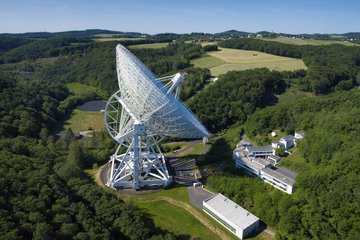Helena Reichlova leads first Dioscuri Centre in the Czech Republic
Solid-state physicist's nomination marks the start for Dioscuri in Czechia
Helena Reichlova, a 36-year-old physicist, will establish the Dioscuri Centre for Spin Caloritronics and Magnonics at the Prague Institute of Physics of the Czech Academy of Sciences on Oct. 1, 2023. She was one of three successful candidates selected during the first call for Dioscuri Centre in the Czech Republic, and will be the first to open her Dioscuri Centre.

Research program for sustainable information technology
The exponentially increasing energy consumption of the information technology sector is a significant challenge for digitized societies. To address this problem, researchers are looking for alternative concepts for information technologies with significantly reduced energy consumption. One such concept is magnonics, which attempts to transport information in the form of spin waves rather than relying on electron movement. Another promising concept is spin caloritronics, which explores, among other things, the use of waste heat. However, both spin caloritronics and magnonics have traditionally been studied in ferromagnetic materials, which are not optimal for efficient conversion of heat to voltage and ultrafast information transfer. The recent discovery of a new class of materials called altermagnets promises to overcome these limitations of ferromagnets.
"Sustainability and environmental issues have always been important to me. This is reflected in my research goals, one of which is to explore more sustainable and energy-efficient information technologies. While spintronics is already reducing energy costs, I am fascinated by the new concepts for information technology of the future, such as spin caloritronics or magnonics, which are currently being studied at the most fundamental level. Compensated magnets, which have been the focus of my previous research, can be of great benefit in this area - so I decided to explore this topic further as part of my new Dioscuri Centre," Reichlova said.
Helena’s Dioscuri Centre aims to open up new research directions and investigate spin caloritronics and magnonics in altermagnets. By focusing on these breakthrough materials, the researcher hopes to achieve results that go beyond spin caloritronics and magnonics and have implications for other scientific and technological fields such as spintronics, field-effect electronics, superconductivity and neuromorphic information technology.
A new center of excellence with an international research network
The new Dioscuri Centre in solid state physics will be funded with up to 1.5 million euros for an initial period of five years. The costs are shared equally by the German Federal Ministry of Education and Research (BMBF) and the Czech Ministry of Education, Youth and Sports (MEYS). The host institution in Prague is providing the infrastructure. Its Department of Spintronics (Magnetic Rotation of the Electron) and Nanoelectronics (Circuit Structures below 100 nm) is a leading center in the related fields of theoretical and experimental antiferromagnetic and age magnetic spintronics. Just in May 2023, the head of the department received his second highly endowed ERC Advanced Grant for his work in the field of altermagnetics. Reichlova's partner from Germany, Sebastian T. B. Goennenwein from the University of Konstanz, is a world-renowned expert in the field of conventional spin caloritronics and magnonics. The goal of the joint research program is to create a new physical paradigm for sustainable IT devices.
Dioscuri: Investment in top early-career researchers
The person-centered funding program aims to attract outstanding early-career researchers to establish a Dioscuri Centre of Scientific Excellence at Central and Eastern European research institutions. The initiator of the Dioscuri program is the outgoing Max Planck President Martin Stratmann. For him, strengthening the European Research Area has been a top priority during his presidency. His core conviction was and is "that we as European science can only be successful in international competition if the European Research Area as a whole is attractive - with a balanced distribution of scientific excellence and a 'brain circulation' between all European countries." To achieve this, the excellence gap that still exists between the science systems of different EU countries must be narrowed and eventually eliminated. In order to increase the attractiveness of establishing a research group in the EU-13 countries, the Dioscuri Programme initiated by the Max Planck Society offers researchers autonomy and flexibility, great scientific freedom and connection to international research networks. The host institution provides administrative support, the best possible infrastructure and a long-term perspective. An attractive offer for young top researchers like Helena Reichlova to return to their home country - and stay there.
The Dioscuri Programme in the Czech Republic is to be expanded to a total of five Dioscuri Centres. A second call, which will also be open to researchers from all scientific disciplines and from all over the world, is planned for 2024.












